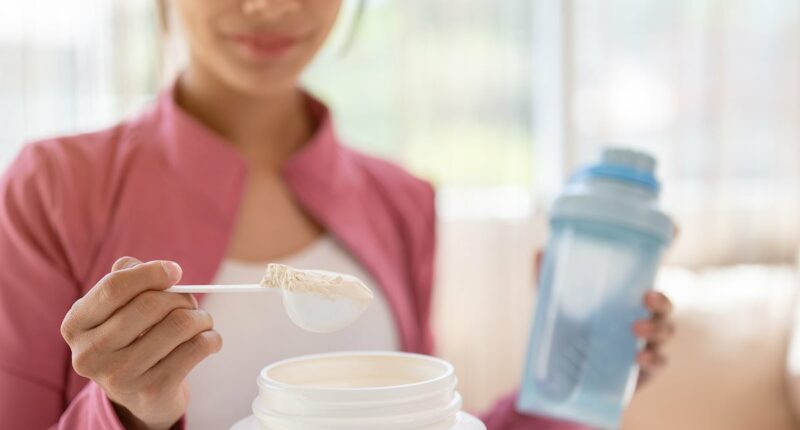Share this @internewscast.com
Experts have warned that a popular health supplement could have dangerous side effects – particularly among older people.
Creatine is a substance naturally generated by the liver, pancreas, and kidneys, and it aids cells in energy production. Athletes and bodybuilders have long consumed it in larger amounts to extend or intensify their workouts, boost performance, and enhance muscle growth.
Lately, there’s been an increase in its popularity among older adults, thanks to research showing that it may also enhance brain function, improve bone health, and alleviate depression.
However, recent studies indicate that creatine can lead to side effects such as diarrhea and vomiting, and in rare instances, it might cause severe kidney and liver issues, potentially resulting in organ failure. Experts emphasize that more thorough research is necessary to confirm the supplement’s safety for older populations.
“Creatine has numerous benefits, but I wouldn’t overly promote its use,” stated Dr. Brendon Stubbs, a senior lecturer at King’s College London.
‘We need longer-term studies looking into its benefits for older people and perimenopausal women, particularly in terms of potential side effects.’
Studies show that around a third of elite athletes take creatine, which is usually sold as a white powder that is then dissolved in water.

Around a third of elite athletes take creatine, which is usually sold as a white powder that is then dissolved in water (picture posed by model)
Until recently, only a small percentage of older adults—six percent of those over 65, according to a 2024 study—were regularly using creatine. Yet, last month, ITV’s Dr. Hilary Jones suggested that older individuals use creatine to maintain muscle strength, which can help protect them from hazardous falls.
However, experts advise that certain individuals, particularly those suffering from kidney disease—where the organs responsible for filtering blood waste and producing urine are compromised—should abstain from taking the supplement.
This is because creatine can put added pressure on kidneys, which has to break down the supplement. They also say that patients should not exceed the daily limit of 5g. Doing so can risk kidney and liver damage.
Some online health influencers recommend taking as much as 20g in one go in order to boost muscle growth.
Concerningly, a 2010 study by researchers in Turkey warned that ‘even the recommended doses of creatine monohydrate supplementation may cause kidney damage’.
One patient who believes his kidneys were affected by the supplement is 79-year-old Andy Cole.
A regular walker, runner and weight trainer, the Cambridgeshire-based former musician was stunned when a routine urine test showed that his kidney were inflamed, putting him on the brink of kidney disease.

Andy Cole, 79, was told by doctors investigating his kidney issues to stop taking creatine. Now his kidney readings are back to normal
He says his previous check-up a year earlier had been normal and the only thing that had changed in that time was that he began taking creatine.
‘When the doctors investigating my kidney issues heard I was taking it, they told me to stop immediately,’ he said.
‘Now, a year later, my kidney readings are back to normal.’
Experts say that, for those concerned about creatine, there are other options.
‘Green tea and dark chocolate – as well as berries, citrus fruits and other brightly coloured fruits and vegetables – are brilliant for brain health,’ says nutritionist Rob Hobson. ‘That’s because these foods are what we call antioxidants, that are thought to protect brain cells from damage.
‘Meanwhile calcium, magnesium and protein all support your bones – which is especially important for older adults.’













